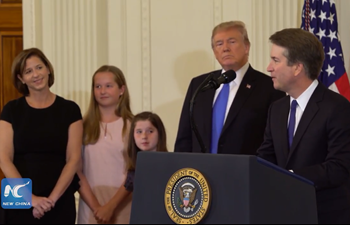by Raimundo Urrechaga
HAVANA, July 11 (Xinhua) -- A planned overhaul of Cuba's private sector has generated excitement and anticipation among the nearly 600,000 self-employed workers.
These workers are generally small business owners who rent houses or rooms, run eateries or provide other services to local residents and foreign visitors.
The regulations, including limiting business licenses to one per person, will take effect in December. They aim to address problems such as the black market, tax evasion and wealth inequality that have long haunted the country's private sector.
"Any activity that is organized (and) planned always brings (good) results to everyone, both providers and receivers of the services," Rafael Cruz, a photographer with seven years of experience, told Xinhua.
Yusney Piedra, a barber in Havana's residential district of Nuevo Vedado, agrees. He has worked as a barber for 12 years, seven of them successfully self-employed.
"I appreciate the new regulations because they will bring greater order to private businesses and organize things so we have greater opportunities," Piedra said.
The Cuban government announced the new rules on Tuesday, marking the first major reform-oriented move made by President Miguel Diaz-Canel since he was elected in April.
The new measures also streamline the existing regulations, reducing the number of business categories from 96 to 28, and that of work-related activities from 201 to 123.
Among the newly approved business categories are bars, nightclubs and beauty services. Besides, those who rent their houses or apartments to tourists are now allowed to rent them to state-owned and foreign companies.
Changes had been expected since the government stopped issuing licenses to several popular businesses nearly one year ago, saying better guidelines for the fast-growing sector were needed.
"The provisions won't represent an increase in taxes for private workers, but aim to correct deviations and violations of the established policy," Deputy Labor Minister Marta Elena Feito said.
The number of self-employed Cubans has nearly quadrupled to more than 591,000 since 2010, around 13 percent of the country's total workforce, according to the state daily Granma.
Running a small business has transformed the lives of many Cubans in recent years.
Michel Soca, a 21-year-old craft vendor, believes the sector has generated dynamism in Cuba's economy and allowed thousands of people to earn more than from a government job.
Private enterprises have raised service quality and living standards.
"Work in the private sector has been a way for Cuban people to move forward and I think it has been beneficial," Soca said.
Jose Carlos, a watchmaker, welcomed the new regulations but said that challenges remain.
"It would be much better if there were wholesale for private workers to buy cheaper goods and not have to import them at expensive prices," he said.
Since 2010, Cubans were allowed to open small businesses to cut state payroll.













